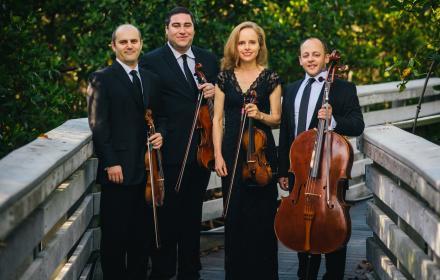Amernet Quartet overcomes distractions at Mainly Mozart Festival
For its annual appearance at the Mainly Mozart Festival the Amernet Quartet presented “Landscapes,” on Sunday, offering a pleasant afternoon of Mozart and Beethoven bisected by an exhilarating journey from Alaska to the South Pacific.
The Biltmore Hotel in Coral Gables provided its own landscape, the cozy Danielson Gallery with balconies on three sides, a dormant fireplace behind the makeshift stage, wood-beamed ceilings, and an unintended soundscape of ambient noise from the hotel pool. The latter provided occasional unwelcome distractions—late-18th century Mozart and 21st century pop definitely don’t mix—but not enough to spoil a satisfying performance.
Visually, the Danielson Gallery is a perfect setting for chamber music–at least for strings. The playing of violinists Misha Vitenson, Marcia Littley, violist Michael Klotz and cellist Jason Calloway came across as deep and rich down low and clear but never metallic high up.
Mozart’s String Quartet No. 17 in B-flat major, one of six quartets he dedicated to Joseph Haydn, was nicknamed “The Hunt” because of the supposed hunting-horn-like call of the opening bars. Although few people today would be familiar with a hunting call, the Amernet’s propulsive performance put one in mind of a hunting party rushing through the forest, occasionally detoured or slowed but relentless in its unflagging pursuit.
There was nothing the Amernet members could do, unfortunately, when the passage for high strings at its conclusion was followed by a burst of screaming from the pool, spoiling the serenity that had been evoked by the musicians.
More than 40 years and a game-changing evolution in music separate 1784 Mozart from 1826 Beethoven, but that evolution is only occasionally evident in Beethoven’s String Quartet No. 16, Op, 135. A lighter work than his other late quartets, Beethoven surely mines the emotions in his final completed work without approaching the angst of his Opus 131 string quartet, completed just months before. Rather, he portrays an optimism one wouldn’t expect from a composer months away from death.
The Beethoven presented by the Amernet Quartet was aware of his mortality but not wallowing in sadness. With fine solo turns by the individual players, the overwhelming impression was of the Amernet’s unity as an ensemble, with a performance impressive for clarity and technical expertise rather than exploring profound depths in the music.
Ernest Bloch’s Paysages (“Landscapes”) was the only detour from familiar musical terrain. This seven-minute suite in three movements was written in the 1920s and provided ample rewards. The Amernet’s high-energy performance conveyed a harried Hitchcockian chase from cold, barren Alaska and across Bloch’s native Switzerland, ending in the South Pacific where, amusingly, the landscape is expressed by a Jewish folk song with an urban edge.
Of course, Biltmore Pool was not one of the landscapes Bloch was trying to convey, but as the final bars of his Tonga faded away, the milieu came across. Loud and clear.
Posted in Uncategorized
Leave a Comment
Mon May 25, 2015
at 1:26 pm
No Comments
